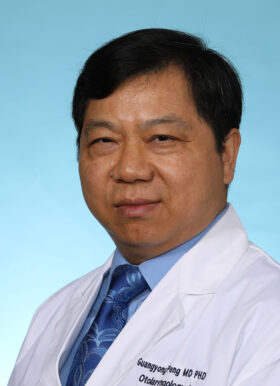
Guangyong Peng, MD, PhD
Professor of Otolaryngology—Head & Neck Surgery
Research interests
Our primary research interest is focused on identifying the roles of different subsets of tumor-infiltrating T cells in the suppressive tumor microenvironments using in vitro with human cells derived from cancer patients, and in vivo in different types of tumor models, including head & neck, lung, colon, breast cancers and melanoma. Another area of interest involves the development of strategies to overcome immunosuppression induced by regulatory tumor-infiltrating T cells and malignant tumor cells for enhanced tumor-immunity and immunotherapy using innate signaling (TLR ligands), metabolic and epigenetic regulations. In addition, the laboratory has been performing translational studies to dissect molecular mechanisms responsible for development of senescence and dysfunction of T cells in different diseases, including cancer, chronic inflammation, and age-related neurological disorders, and then to develop effective strategies for control of T cell fate and function for disease prevention and immunotherapy.
Education
- 2002-2007 Postdoctoral Fellow, Center for Cell and Gene Therapy, Baylor College of Medicine, Houston, TX
- 1999-2002 PhD in Immunology, Chinese Academy of Preventive Medicine, Beijing, China
- 1996-1999 MS in Microbiology, Nanjing Medical University, Nanjing, China
- 1988-1993 MD, Jiangsu University School of Medicine, Zhenjiang, China
Leadership Roles & Honors
- 2022, Tumor Immunobiology Section Chair, AACR annual meeting 2022
- 2019-2022, Established Investigator Award, Melanoma Research Alliance (MRA)
- 2019, AAI Laboratory Travel Award, The American Association of Immunologists
- 2018, AAI Laboratory Travel Award, The American Association of Immunologists
- 2017, AAI Laboratory Travel Award, The American Association of Immunologists
- 2016, AAI Laboratory Travel Award, The American Association of Immunologists
- 2014, Lustgarten-eBioscience Memorial Award, The American Association of Immunologists
- 2011-2014, Young Investigator Award, Melanoma Research Alliance (MRA)
- 2011, AAI Junior Faculty Travel Award, The American Association of Immunologists
- 2010-2015, Research Scholar, American Cancer Society (ACS)
- 2010, AAI Junior Faculty Travel Award, The American Association of Immunologists
- 2007, Career Development Award, Department of Internal Medicine, Saint Louis University
- 2007, Career Development Award Training Grant (T32), NIH, USA
Selected publications
View Dr. Peng’s research, publications and collaborations »
- Zhao Y, Liu X, Si F, Huang L, GaoA, Lin W, Hoft DF, Shao Q, Peng G. Citrate promotes excessive lipid biosynthesis and senescence in tumor cells for tumor therapy. Advanced Science. 2022, Jan; 9(1): e2101553. doi: 10.1002/advs.202101553.
- Liu X, Hoft DF, Peng G. Tumor microenvironment metabolites directing T cell differentiation and function. Trends Immunol. 2022 Feb; 43(2): 132-147. doi: 10.1016/j.it.2021.12.004.
- Liu X, Si F, Bagley D, Ma F, Zhang Y, Tao Y, Shaw E, Peng G. Blockades of effector T cell senescence and exhaustion synergistically enhance anti-tumor immunity and immunotherapy. J Immunother Cancer. 2022 Oct; 10(10): e005020. doi: 10.1136/jitc-2022-005020.
- Liu X, Li L, Si F, Huang L, Zhao Y, Zhang C, Hoft DF, Peng G. NK and NKT cells have distinct properties and functions in cancer. Oncogene.2021 Jul; 40(27): 4521-4537. doi: 10.1038/s41388-021-01880-9.
- Gao A, Liu X, Lin W, WangJ, Wang S, Si F, HuangL, Zhao Y, Sun Y, Peng G.Tumor-derived ILT4 induces T cell senescence and suppresses tumor immunity. J Immunother Cancer. 2021 Mar; 9(3): e001536. doi: 10.1136/jitc-2020-001536.
- Liu X, Hartman CL, Li L, Albert CJ, Si F, Gao A, Huang L, Zhao Y, Lin W, Hsueh EC, Shen L, Shao Q, Hoft DF, Ford DA, Peng G. Reprogramming lipid metabolism prevents effector T cell senescence and enhances tumor immunotherapy. Sci. Transl. Med. 2021 Mar 31; 13(587): eaaz6314. doi: 10.1126/scitranslmed.aaz6314.
- Liu X, Hoft DF, Peng G. Senescent T cells within suppressive tumor microenvironments: Emerging target for tumor immunotherapy. Journal of Clinical Investigation. 2020 Mar 2; 130(3):1073-1083. doi: 10.1172/JCI133679.
- Li L, Liu X, Sanders KL, EdwardsJ, YeJ, Si F, Gao A, Huang L, Hsueh EC, Ford DA, Hoft DF, Peng G. TLR8-mediated metabolic control of human Treg function: A mechanistic target for cancer immunotherapy. Cell Metabolism. 2019 Jan 8; 29(1): 103-123. doi: 10.1016/j.cmet.2018.09.020.
- Ma C, Wang F, Han B, Zhong X, Si F, Ye J, Hsueh EC, Robbins L, Kiefer SM, Zhang Y, Hunborg P, Varvares MA, Rauchman M, Peng G. SALL1 functions as a tumor suppressor in breast cancer by regulating cancer cell senescence and metastasis through the NuRD complex. Molecular Cancer. 2018 Apr 6; 17(1): 78. doi: 10.1186/s12943-018-0824-y.
- Liu X, Mo W, Ye J, Li L, Zhang Y, Hsueh EC, Hoft DF, Peng G. Regulatory T cells trigger effector T cell DNA damage and senescence caused by metabolic competition. Nature communications. 2018 Jan 16; 9(1): 249. doi: 10.1038/s41467-017-02689-5.
- Ye J, Ma C, Hsueh EC, Dou J, Mo W, Liu S, Han B, Huang Y, Zhang Y, Varvares MA, Hoft DF, Peng G. TLR8 signaling enhances tumor immunity by preventing tumor-induced T-cell senescence. EMBO Mol Med. 2014 Oct; 6(10): 1294-311. doi: 10.15252/emmm.201403918.
- Ye J, Huang X, Hsueh EC, Zhang Q, Ma C, Zhang Y, Varvares MA, Hoft DF, Peng G. Human regulatory T cells induce T-lymphocyte senescence.Blood. 2012 Sep 6; 120(10): 2021-31. doi: 10.1182/blood-2012-03-416040.
- Peng G, Guo Z, Kiniwa Y , Voo KS, Peng W, Fu T, Wang DY, Li Y, Wang HY, Wang RF. Toll-like receptor 8-mediated reversal of CD4+ regulatory T cell function. Science. 2005 Aug 26; 309(5739):1380-4. doi: 10.1126/science.1113401.
- Peng G, Wang HY, Peng W, Kiniwa Y, Seo KH,Wang RF. Tumor-Infiltrating gammadelta T cells suppress T and dendritic cell function via mechanisms controlled by a unique toll-like receptor signaling pathway. Immunity. 2007 Aug; 27(2): 334-48. doi: 10.1016/j.immuni.2007.05.020.
- Wang HY, Lee DA, Peng G, Guo Z,Li Y, Kiniwa Y, Shevach EM, Wang RF. Tumor-specific human CD4+ regulatory T cells and their ligands: implications for immunotherapy. Immunity. 2004 Jan; 20(1): 107-18. doi: 10.1016/s1074-7613(03)00359-5.